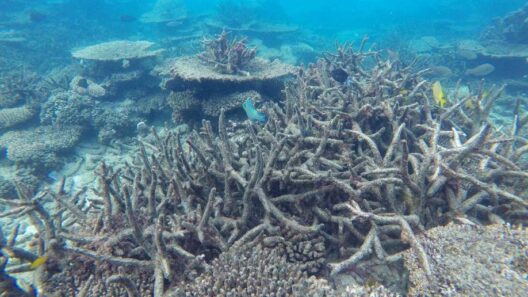The Atlantic Ocean, a colossal expanse of water, acts as a critical component of our planet’s climate system. As global temperatures surge, the waters of the Atlantic are experiencing a significant rise in temperature, an alarming phenomenon often referred to as “the Atlantic’s fever.” This warming has profound implications, embodying a wider narrative about climate change and its cascading effects on our environment, ecosystems, and societies.
Historically, oceans have experienced natural fluctuations in temperature, driven by various climatic cycles, such as the El Niño or La Niña events. However, the current trends indicate an unnerving acceleration in ocean warmth. This alteration operates as a multifaceted mechanism that influences weather patterns, sea-level rise, marine biodiversity, and even human health. Understanding the intricate details behind this phenomenon reveals a deeper insight into the broader challenges facing our planet.
One of the most conspicuous effects of rising ocean temperatures is the alteration of weather patterns. The Atlantic plays a pivotal role in global weather systems. As the ocean’s thermal gradients shift, this transition directly affects atmospheric circulation. For instance, warmer waters in the North Atlantic can lead to more potent and frequent hurricanes due to increased evaporation rates. A warmer ocean enhances the energy available for storms, resulting in torrential downpours and devastating winds, which can wreak havoc on coastal communities. The meteorological consequences appear daunting: rising precipitation extremes, prolonged droughts in certain regions, and heavier floods in others. In this way, the fever of the Atlantic manifests as an ominous harbinger of extreme weather phenomena, altering longstanding climate equilibrium.
Equally concerning is the phenomenon known as ocean stratification. Warmer surface temperatures inhibit the mixing of ocean layers, leading to the stagnation of nutrient distribution. With distinct layers forming, nutrient-rich waters become trapped below, depriving phytoplankton— the foundation of the marine food web—of essential nutrients. This decline in primary productivity disrupts the entire ecosystem, leading to reduced fish populations and threatening the livelihoods of communities dependent on fishing. Moreover, the cascading effects can be felt across the globe as fisheries collapse, forcing nations into food insecurity.
Alongside ecological repercussions, the rising temperatures of the Atlantic also have significant implications for marine biodiversity. Coral reefs, the rainforests of the ocean, are particularly vulnerable to thermal stress. Fluctuations in temperature can lead to coral bleaching— a process where stressed corals expel the algae living in their tissues. The loss of this symbiotic relationship leads to decreased coral health, impacting the myriad of marine organisms that rely on reefs for habitat and sustenance. Such phenomena have prompted alarming declines in marine biodiversity, threatening the intricate relationships woven throughout aquatic ecosystems.
Furthermore, the effects of rising ocean temperatures extend beyond the boundaries of ecological health. They pose threats to human populations. Coastal cities, often densely populated and economically vital, are increasingly susceptible to the impacts of rising sea levels, driven by both thermal expansion and glacial melt. The phenomenon of sea-level rise is not merely an abstract statistic; it translates into real-world struggles, from flooding in low-lying areas to saltwater intrusion that threatens freshwater supplies. Vulnerable populations, particularly in developing nations, face existential challenges, illustrating the intersection of climate change, social justice, and economic stability.
Moreover, the warming Atlantic serves as a catalyst for the spread of marine diseases. Pathogens and parasites flourish in warmer waters, leading to outbreaks that affect marine species and human health. The warmer ocean not only supports the proliferation of harmful algal blooms, which can produce toxins detrimental to both marine and human life, but it also facilitates the migration of disease-carrying organisms, ultimately posing risks to public health. The fishing communities, often reliant on these resources, find themselves grappling with the implications of contaminated catches and the necessity of stringent health advisories.
As we delve deeper into the Atlantic’s fever, it becomes apparent that addressing climate change is not simply about mitigating temperature rise; it is about recognizing the interconnectedness of ecosystems, human socioeconomic structures, and global systems. Effective climate action must, therefore, transcend national borders and incorporate a holistic approach that promotes sustainable practices, mitigates damage, and fosters resilience against inevitable changes.
To foster change, innovative solutions and partnerships are essential. Policymakers, scientists, and communities must collaborate to develop adaptive strategies. Investing in renewable energy sources, enhancing coastal infrastructure, and promoting sustainable fishing practices represent some pathways forward. Furthermore, global treaties and agreements aimed at limiting greenhouse gas emissions play a critical role in addressing the root causes of climate change and curbing the alarming warming trends we observe today.
In conclusion, the Atlantic’s fever is not merely a phenomenon to observe; it is a call to action. Understanding how the changing temperatures of this vast ocean influence weather patterns, marine ecosystems, and human health urges society to confront the broader implications of climate change. It is a narrative interwoven with scientific inquiry, social responsibility, and action, encompassing not only the fascinating observations of changing oceanic conditions but also the complex realities intertwined with our global existence. The time for recognition, acknowledgment, and substantive action is now—rather than waiting for the next warning sign from the depths of our warming oceans.







